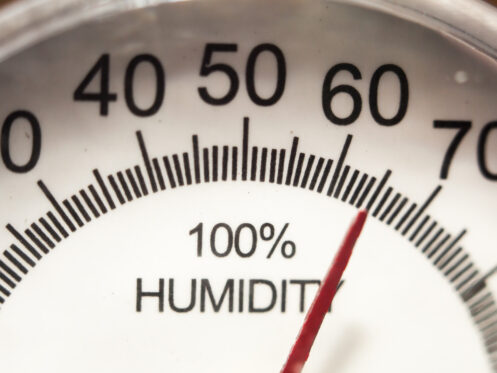In all the years Aurora Pro Services Heating, Air, Plumbing, Electrical, & Roofing has been doing business in Greensboro, we have noticed an interesting trend related to weather conditions in the Triad region and the services we provide. As the summers become more intense in terms of high temperatures and heavy rainfall, we get more service calls for issues arising from humidity. The issues range from inadequate air conditioning to roof leaks and from poor air quality to corrosion in the electrical wiring.
Humidity is one of those environmental factors that gradually sneaks up on homeowners. It can slowly turn from pesky to aggravating, but it can rapidly devolve into unsafe situations that require expensive repairs or mitigation. At a time when it seems that relative humidity levels are not backing down in Greensboro, it helps to learn about how to keep them under control in your house.
The Hidden Dangers of High Humidity
When you visit a website or launch a mobile app to get a weather forecast for Greensboro or Winston-Salem, the temperatures you see are based on two measurements. The high and low readings for the day are measured from the air with a thermometer and are known as air temperatures. The heat index, which is often expressed as the “feels like” or “real temperature,” is a composite of the air temperature and the relative humidity, and it represents how hot you will feel throughout the day.
Relative humidity refers to atmospheric moisture. When you have high temperatures combined with higher levels of humidity, the heat index will climb, and you will get that exasperating feeling of dealing with muggy conditions. Not many people know that the heat index is measured in the shade. If you see a heat index of 95 degrees Fahrenheit reported on the news, this measurement will be at least five degrees higher when you go outside and stand under the intense sunlight.
When the heat index strikes 90 degrees and above, a few health considerations begin to emerge, and we will discuss those in a section below. For now, let’s review the risks that prolonged humidity can cause in your home:
Accumulated Condensation
When warm, humid air comes into contact with a cold surface, it can condense and form tiny water droplets. When this happens frequently, it can cause problems with insulation, drywall, and other building materials that should be kept dry.
Air Conditioning Issues
If a cooling unit is not properly maintained, it may not be able to keep your home adequately cool during periods of hot and humid weather. In turn, this can result in uncomfortable living conditions and even health problems.
Damage to Electrical Wiring
High humidity levels can cause electrical wiring to corrode and become damaged over time. This can lead to electrical fires if the copper elements separate and degrade to the point of arcing.
Mold and Mildew Growth
When the humidity levels in your home stay high, they can create an environment that is conducive to mold and mildew growth. When mold grows out of control, it can damage everything from surfaces to furniture to electronics. We will later discuss the problems with allergies and respiratory infections that mildew can bring about.
Roof leaks
If a roof is not properly sealed, it can leak during periods of heavy rain or snow. This can cause water damage to the interior of a home. In Greensboro, many homeowners notice this issue when they see water stains on the ceiling even if not a single drop fell on the floor.
Something that Aurora Pro Services Heating, Air, Plumbing, Electrical, & Roofing technicians notice when they go out on service calls related to humidity is that many homeowners had been aware of the problem for weeks or months, but it did not seem bad enough to them at the time to do something about it. Let’s say you see a mildew spot on the ceiling tile above your walk-in closet. Most homeowners will wipe it off and either forget about it or come back to revisit it a couple days later, but what about the source of the moisture? If it comes from a section of the central air conditioning duct, chances are that it is a condensation issue that could worsen into a leak. We mention closets because we know of many cases in which residential humidity levels have ruined wardrobes, books, documents, and even artwork stored in closets.
How to Keep Your Home’s Humidity at the Ideal Level
Efficient temperature control can go a long way toward managing moisture levels in your house, but this is just one strategy. Some situations call for decreasing air moisture with dehumidifiers or even using humidifiers to do the opposite, and we’ll get to those in the next section related to health concerns. Above all, moisture control relies on providing adequate ventilation, which you can accomplish by leaving windows and doors open when the weather allows it.
Some residential architecture styles in North Carolina are not conducive to proper ventilation. The floor plans of ranch-style homes from the 1970s, for example, do not promote efficient airflow, and the same can be said about older split-level models. Ceiling fans and whole-house weather stripping are ideal for properties where ventilation is not the best. Proper HVAC maintenance can help address the issue of homes that get overly humid, and there’s also the surefire strategy of installing a whole-house dehumidifier.
Humidity and Your Health: What You Need to Know
When you live in a house that is constantly humid, the risk of negative health effects increases exponentially. Mold and mildew can trigger allergies and respiratory conditions such as asthma and bronchitis. If you are sensitive to airborne pathogens, high moisture concentrations will likely affect you. Plus, there is always the problem of higher temperatures felt when the relative humidity is also high. Heat stress and high humidity can worsen some existing health conditions.
Sick building syndrome is the most worrisome health issue related to humidity. This condition is characterized by symptoms such as headaches, fatigue, and respiratory problems related to poor indoor air quality compounded by air moisture. It should be noted that sick building syndrome is an environmental health condition that is still being researched. What is known thus far is that mold, mildew, and volatile organic compounds that circulate in the air can cause negative reactions in the immune system.
Finally, the installation of whole-house humidifying or dehumidifying systems gives homeowners absolute control over their indoor humidity levels. Some of our customers in Greensboro have requested installations of humidifiers that help them manage dermatological conditions, certain kinds of asthma, and bronchitis. Other customers install dehumidifiers because they are overly sensitive to mold spores. In other cases, some people with sensitive skin can get a heat rash if they are exposed to high indoor air moisture levels.
Should you have questions about controlling the humidity levels in your Greensboro or Triad area home, don’t hesitate to get in touch with us at Aurora Pro Services Heating, Air, Plumbing, Electrical, & Roofing. We are certified and licensed, and we provide heating, air conditioning, plumbing, electrical, and roofing services. Contact our office today for more information about keeping the humidity in your home at optimal levels.






